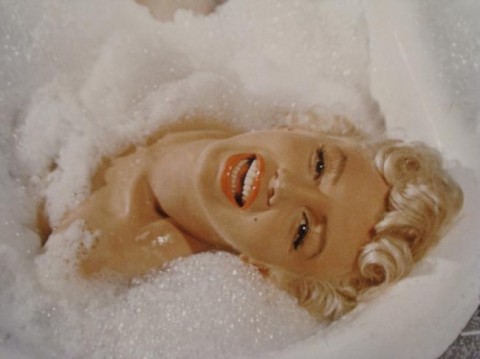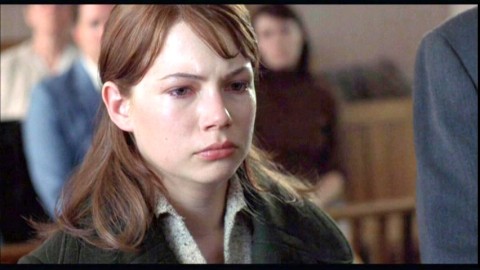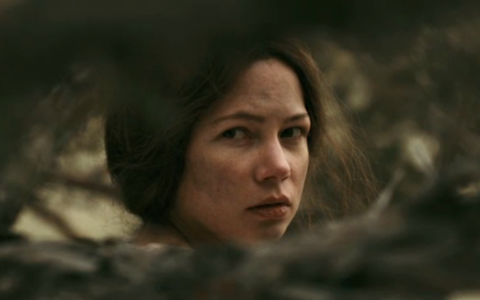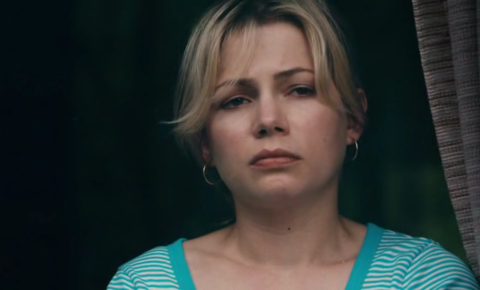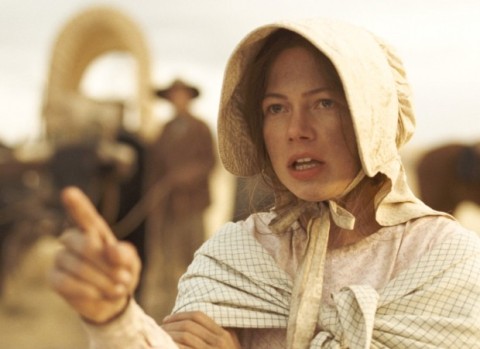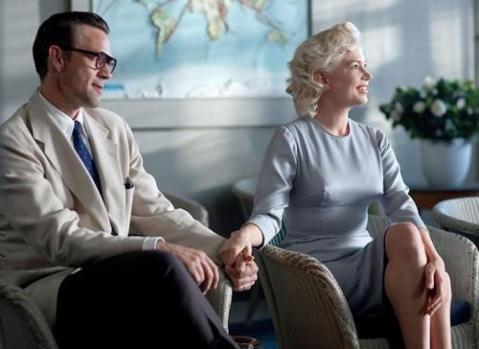Michelle Williams’ mouth
2 July 2012
Michelle Williams’ mouth is the thing I stare at when I watch her. As an actress she can be a chameleon — I mean, Marilyn Monroe! — but in the end her mouth alone does so much to convey complicated emotions. Her mouth is what always makes her performance so distinctive.
Her mouth has gravity. Her mouth shows her disappointment, her struggles. Michelle Williams has the mouth that belies all her other beautiful attributes. Even when she enacts (very effectively) the lusciousness of Monroe, her mouth brings us back:
Whereas the real Monroe’s mouth only confirmed our mythos about her (tongue is in evidence):
Readers will know that I’ve always got my eyes open for actresses who break out of the ridiculously strict Hollywood standards when it comes to noses, mouths, body size, and other body parts so frequently adjusted by plastic surgeons. Now, don’t get me wrong: I’m certainly not saying that Michelle Williams’ mouth is unattractive or shaped oddly — far from it. Williams is a beautiful woman in many, many conventional ways.
And yet. Her full cheeks and mouth do things that render Williams’ conventional beauty so much more interesting. Her mouth almost makes me think that she doesn’t truly know how beautiful she is.
Her mouth can do things that Monroe’s refused to do: be hard, express shame or blubbering lack of control, convey a lifetime of disappointment. Whereas it seems impossible for Monroe to appear plain, Williams is at her brilliant best when that mouth draws downward and all we can see is her bald emotions, her character’s true despair.
Think about her role in Brokeback Mountain (2005) as Alma, that ordinary little thing who marries Ennis Del Mar (Heath Ledger) knowing they’ll have a hard life together. They’re both quiet (bordering on silent, really) and dirt-poor, and once the babies start coming they’ll be poorer. That’s okay with her. It’s not like she expected anything else; she knows they’ll get old and stiff long before they ought to. But then she sees her husband kissing his friend Jack with a passion, sheer hunger and the attention she’s never gotten from him, not even once:
That bottom lip of hers is so full, so heavy. At first she’s just registering all this new information — she’s so stunned she doesn’t know how she feels. Then she knows only that she’s hurt, and the mouth drops. She’s so close to becoming ugly, and she knows she’ll be ugly if she cries.
She lets herself be ugly when they fight. She’s too angry to care anymore. She doesn’t know whether to be afraid or dare to believe that she’s the one with the power now.
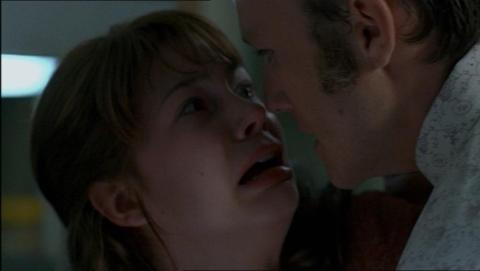
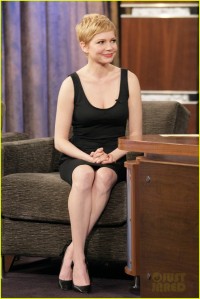 That’s Williams at her most extreme, the far end of the spectrum from her Interview Face. When she sits for interviews, she disguises her expressive mouth behind a lovely and enigmatic smile. She is very good at appearing so self-possessed as to be quite evasive, as if she’s an ideal 19th-century demure heroine.
That’s Williams at her most extreme, the far end of the spectrum from her Interview Face. When she sits for interviews, she disguises her expressive mouth behind a lovely and enigmatic smile. She is very good at appearing so self-possessed as to be quite evasive, as if she’s an ideal 19th-century demure heroine.
Get it, people? She is just beautiful — a woman with spectacular cheekbones and an ability to pull off that pixie haircut. If this was all we ever saw, I’d have nothing much to say.
If I’m going to be honest, I’ll admit that what I find so great about her mouth is that it has the same natural droop as some of those older women in my family — you can see it in photos of my hardworking, stone-faced granny when she was middle-aged and saddled with an alcoholic husband. You can see it in the family photos of those other abuelas who picked cotton and had too many children and worked in canneries and stayed poor all their lives.
So maybe part of my love for that mouth is the fact that she can harness it in her acting to evoke other lives.
Williams is still too young (she is 31) and too sweet-cheeked to show the lines around the mouth that my granny had, of course. But with characters like Emily Tetherow in Meek’s Cutoff (2010) and even Cindy in Blue Valentine (2010) she shows that she can look far older than she is, far too aware of the dark side, caught in vise-like gender traps.
She has that capacity to look emotionally bruised, resigned, on the brink. She somehow encompasses both fragility and a growing hardness.
I never watched her first big role in Dawson’s Creek (1998-2003) as Jen, the city girl who grew up too fast and got sent down to live with her grandmother in a more restrained setting. From the photos I’ve seen, she appears as a far more glamorous pretty girl than I’ve seen her from her career as the darling of independent film. I prefer the latter-day Williams, discovered and used to such effect by Kelly Reichardt in Wendy and Lucy (2008) and later in Meek’s Cutoff. To find someone to inhabit the roles of these quiet women who wrangle with overwhelming problems, Reichardt needed someone with a face.
Reichardt needed someone with a face that could indicate a complicated personal history because her films don’t belabor those back stories. You need to be able to look at Wendy’s face (below) and know that, when things get complicated, she might not have the strength to face it all, partly because she’s had to face hard things before.
I’ve been marveling lately at an emotion you don’t often see on American actors’ faces, but which British actors in particular excel at: self-disgust. Nor is this emotion limited to character actors with funny faces. This emotion is most striking when it appears on the face of a strikingly attractive person. I think I first noticed it when I saw Helen Mirren in Prime Suspect (maybe even that first series, all the way back in 1991), but I’ve seen Tilda Swinton, Richard Armitage, Pierce Brosnan (of all people) and even Hugh Grant (when he’s not being a toothy douchebag) show us that they can be susceptible to the same private self-loathing as the rest of us. Mirren and Swinton are especially good at showing us that expression when they look at themselves in bathroom mirrors.
Michelle Williams hasn’t quite gotten all the way to self-disgust. Or at least I haven’t seen it yet. But we see other dark moods cross her face that aren’t quite so clear-cut. And when they do, that’s when her acting becomes most lyrical.
She’s so good at becoming that character who goes inside herself, who shuts herself off as in Blue Valentine, or who flits between her fear of uncertainty and her temptations to adultery in Take This Waltz (2011). She’s one of those actors who fosters an extraordinary relationship with her viewers (perhaps even most her female viewers, who recognize those facial expressions?) because of her seeming isolation, her impulse to make herself invisible, and the emotional gymnastics it takes for fragile people to deal with isolation.
Sometimes it just takes a small purse of the lips. To allow one’s eyes to get a bit more hooded.
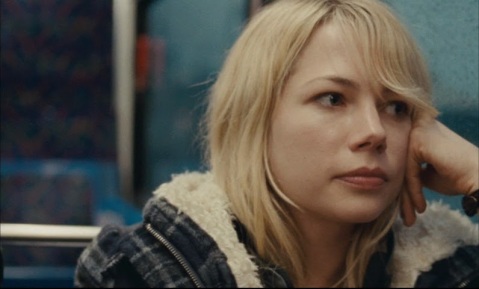
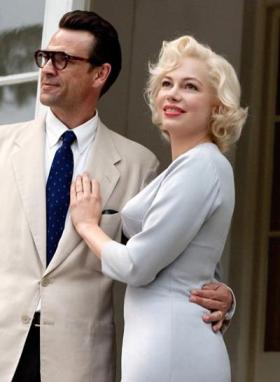
Which brings me back to the odd choice of opting to portray Monroe. Why would an actress do that to herself? Why would an actress be persuaded to step into the shoes of a woman so iconic, so famed for her beauty and full-to-bursting sensuality?
For Michelle Williams to take on the role of Marilyn Monroe is not equivalent to Meryl Streep’s roles as real-life/ historic figures. Honestly: to me it sounds like a nightmare. Who among us could survive the inevitable comparisons, the naysayers who say she’s not beautiful enough to play Monroe?
Yet after thinking so extensively about Williams’ mouth and its frequent on-screen plunges downward, its gravity and its evocation of disappointment and pain, I have now determined that this must have seemed like the most extraordinary physical challenge for an actor. She has spoken extensively about gaining weight for the role and learning how to wiggle across a room with curves (whereas Williams is normally a tiny slip of a thing, like all actresses these days).
Yeah, whatever. Actors are always gaining/ losing weight and making a big noise about it, like they want to be congratulated for how hard it is. If you ask me, the real challenge was to use her mouth differently, and thereby the rest of her face. She had to loosen up her mouth, widen her eyes, adopt a new openness and insecurity to convey a wholly different breed of fragility.
In a Vogue interview, Williams said some fascinating things about stepping into this part by thinking about Monroe’s relationship to the world:
Someone once said that Marilyn spent her whole life looking for a missing person — herself. And so she cobbled together what people thought, felt, saw, and projected onto her and made a person out of it. She had no calm center inside herself that she could come home to and rest.
The challenge was to play a person so eager to please, so eager to be visible. Marilyn’s mouth always conveyed her availability; even 50 years after her death, a photo of her will make you want to run your tongue all over her beautiful open lips. What could be a better challenge for an actor like Williams — who’s prone to such a rigid private reserve — than to try to become that woman who “had no calm center inside herself”?
It’s too bad My Week With Marilyn wasn’t a better film. But that’s really beside my larger point. Someday soon I’m going to rent it again just to watch again how Williams loosens up the bottom half of her face for the role, and think again about how it contrasts with her versions of hard, disappointed, downtrodden women like Alma and Wendy.
Is there another actor out there whose mouth does so much of the heavy lifting in her acting? And in the meantime, have you gotten around to seeing her in Take This Waltz yet?
Sir Helen Mirren and being sexy
28 June 2010
At 65, Helen Mirren has a new film coming out: “Love Ranch,” in which she stars as the madam of a Nevada brothel in the 70s. Her character manages the prostitutes with such an iron fist that her pig of a husband (Joe Pesci) screams at her, “Who do ya think you are, the Queen of fuckin’ England?” (This line alone is the very best possible advertisement for this film, as far as I’m concerned.) For a somewhat absurdly prurient interview reflecting on her long career being sexy, she posed nude in the bath this month for New York Magazine, and this seems to be a source for one of those “should she or shouldn’t she?” debates. Honestly? Someone out there is looking to tell Helen Mirren whether to strip? I have no such hubris. She has had a long career of being sexy, such that it put me in mind of something Tilda Swinton said recently about being knighted, to the effect that Sir Helen sounds much better than Dame Helen. This entire conversation makes me realize that when journalists and the public don’t know what to do with an exceptionally intelligent, attractive, and successful woman, they turn the conversation into one about sexiness.
 American viewers like me didn’t really get much of Helen Mirren until she was in her mid-30s, and I first knew her in the “Prime Suspect” series made when she was well into her 40s. The first episode (1991) was a revelation to me, not least because it followed so quickly on the heels of Anita Hill’s allegations of sexual harassment against Clarence Thomas during his Supreme Court hearings during the Fall of 91. As a result, Mirren’s version of DCI Jane Tennison — steely, professional, brilliant, occasionally abhorrent, and daily faced with men’s obstreperousness — seemed pitch-perfect for the age. Her very body language showed a lifetime of keeping her body in check in a male-dominated world; she covered herself in unsexy suits and kept her face impassive. She was sexy to us viewers because she was so exceptionally smart and real, not because she displayed any kind of prurient sexuality onscreen. Women viewers could so many things into a closeup of Mirren’s face: intelligence, weakness, self-loathing, pride, self-possession, and all that in a single look. This was why she was so appealing to us, not because she took off her clothes. Let’s also not overlook the fact that for a woman actor to achieve such international fame only starting in her mid-40s is well-nigh unprecedented.
American viewers like me didn’t really get much of Helen Mirren until she was in her mid-30s, and I first knew her in the “Prime Suspect” series made when she was well into her 40s. The first episode (1991) was a revelation to me, not least because it followed so quickly on the heels of Anita Hill’s allegations of sexual harassment against Clarence Thomas during his Supreme Court hearings during the Fall of 91. As a result, Mirren’s version of DCI Jane Tennison — steely, professional, brilliant, occasionally abhorrent, and daily faced with men’s obstreperousness — seemed pitch-perfect for the age. Her very body language showed a lifetime of keeping her body in check in a male-dominated world; she covered herself in unsexy suits and kept her face impassive. She was sexy to us viewers because she was so exceptionally smart and real, not because she displayed any kind of prurient sexuality onscreen. Women viewers could so many things into a closeup of Mirren’s face: intelligence, weakness, self-loathing, pride, self-possession, and all that in a single look. This was why she was so appealing to us, not because she took off her clothes. Let’s also not overlook the fact that for a woman actor to achieve such international fame only starting in her mid-40s is well-nigh unprecedented.
 It was similar with her acting in “The Queen” (2006), in which again she could be utterly despicable and absolutely sympathetic in rapid succession from one scene to the next. It was those scenes of her locked away at Balmoral during the English national mourning for Diana’s death — her personal dedication to a certain tight-lipped version of reality, and her slow realization that she was sadly out of touch — that made Mirren appear again so compelling as an actor. In an era when women are loath to let themselves be bitches (and I speak for myself and every other female college professor out there, and likely for everyone else over 30 too), Mirren’s characters display how one can be bitchy and appealing at the same time. It made her all the sexier to me, and I wonder if American women could learn something from the mix of hardness and softness: in an ideal future the antifeminist conversation we’ve been having about what makes a woman sexy, feminine, or bitchy simply cannot hold, such that a new version of femininity is due to arrive that celebrates a considerable degree of intelligent steeliness. Her performance in “The Last Station” (2009) was similar: her take on the histrionic Sofya showed her to be highly emotional, yet also far more astute about the nature of marriage than her idealistic husband, Tolstoy (Christopher Plummer). “Why should it be easy?” she demands from him in one of my favorite scenes. “You are the work of my life and I am the work of yours. That’s what love is.”
It was similar with her acting in “The Queen” (2006), in which again she could be utterly despicable and absolutely sympathetic in rapid succession from one scene to the next. It was those scenes of her locked away at Balmoral during the English national mourning for Diana’s death — her personal dedication to a certain tight-lipped version of reality, and her slow realization that she was sadly out of touch — that made Mirren appear again so compelling as an actor. In an era when women are loath to let themselves be bitches (and I speak for myself and every other female college professor out there, and likely for everyone else over 30 too), Mirren’s characters display how one can be bitchy and appealing at the same time. It made her all the sexier to me, and I wonder if American women could learn something from the mix of hardness and softness: in an ideal future the antifeminist conversation we’ve been having about what makes a woman sexy, feminine, or bitchy simply cannot hold, such that a new version of femininity is due to arrive that celebrates a considerable degree of intelligent steeliness. Her performance in “The Last Station” (2009) was similar: her take on the histrionic Sofya showed her to be highly emotional, yet also far more astute about the nature of marriage than her idealistic husband, Tolstoy (Christopher Plummer). “Why should it be easy?” she demands from him in one of my favorite scenes. “You are the work of my life and I am the work of yours. That’s what love is.”
 In the new film as the queen of the brothel, her character deals with her horrible husband and a cancer diagnosis by undertaking a torrid affair with a young boxer thirty years her junior (online photos of the actor Sergio Peris-Mencheta make him look like an even more Hollywood-ready version of Rafael Nadal, if such a thing were possible). Despite the titillating account in the New York Magazine article, I doubt Mirren took this part because it allows her to look like a 65-year-old cougar. In this regard the article is inherently weak and reveals in its very quotes from her that its overall portrayal of Mirren as a sexpot is flawed. Take the following:
In the new film as the queen of the brothel, her character deals with her horrible husband and a cancer diagnosis by undertaking a torrid affair with a young boxer thirty years her junior (online photos of the actor Sergio Peris-Mencheta make him look like an even more Hollywood-ready version of Rafael Nadal, if such a thing were possible). Despite the titillating account in the New York Magazine article, I doubt Mirren took this part because it allows her to look like a 65-year-old cougar. In this regard the article is inherently weak and reveals in its very quotes from her that its overall portrayal of Mirren as a sexpot is flawed. Take the following:
As Mirren explains it, she struggled to get a handle on her own sexuality in order to use its power to accomplish her ambitions. “The Playboy Mansion, coke, and the rise of all that — Guccione and Hefner always pushed it as liberation, but it didn’t seem like that to me,” she says. “That was women obeying the sexualized form created by men — though maybe we always do that, because we want to be attractive. But I was kind of a trailblazer because I demanded to do it my own way. I’d say, ‘I’m not having it put on me by someone else.’ I didn’t want to be the sort of puritanical good girl with a little white collar who says, ‘Don’t shag until you get married.’”
The resulting phony “debate” about whether Mirren should have stripped for the magazine’s photo shoot reveals that we’re trapped in a pornified conversation about women and sexiness. In this quote she criticizes the terms of that very conversation, but the magazine can’t quite grasp what might lie outside it, so it offers her up as some kind of GILF (for example, it reminds readers of the paparazzi photos of a couple of years ago showing her looking pretty goddamn awesome in a red bikini). Oh for fuck’s sake. Sexing her up allows writers to take her a little less seriously as one of the most stunning actors of her generation. But in doing so they overlook her real appeal, and that just makes me tired.
Queer eyes and smart girls
11 April 2010
…in which I think about smart objects of desire and girls’ willingness to identify with both boys and girls.
I used to have a crush on Jon Stewart, but for a long time now it’s been Rachel Maddow. Exemplary of her crush-worthiness is when she interviewed J. D. Hayworth — the conservative Tea Party opponent of John McCain in the upcoming AZ Republican primary — who’s been making a lot of political hay reviving the gay marriage “problem.” The homophobic Hayworth claims that the Massachusetts Supreme Court defines marriage as “the establishment of intimacy,” and argues that such a definition leaves open the possibility that men will marry horses:
Maddow: “Where in Massachusetts law or in the Supreme Court ruling does it say, ‘the establishment of intimacy?’ I read, spent the whole afternoon sort of looking for that, and couldn’t find it anywhere.”
Haworth: “The high court in Massachusetts defined marriage in a rather amorphous fashion, simply as, quote, ‘the establishment of intimacy.’ Now, I think we all agree there’s much more to marriage than that.”
Maddow: “Sir, I’m sorry, it didn’t.” (Goes through every example of the use of “intimacy” in the decision and MA state law and shows it doesn’t appear.)
Hayworth: “Well, that’s fine. You and I can have a disagreement about that.”
Maddow: “Well, either it’s true or it isn’t. It’s empirical.” (Hayworth stumbles and fumbles on his way out of the interview.)
Me, fawning: “Rachel, will you marry me?”
It’s not just that Maddow speaks truth to power, like Stewart did on “Crossfire” back in 2004; it’s the brevity and lucidity of her comments like “it’s empirical” that make me go mad for Maddow. (Plus, obviously, she takes no prisoners, likes cocktails, speaks frequently of her partner Susan, and is a geek). But then I have a long history of wanting to be with smart girls, wanting to be them, wanting to do them, wanting to watch them. It’s baffling to me that, according to received wisdom, men only want to watch men. (Cheers to all those actual men out there who feel the same way I do about smart women.)
Smart girls are hot. Lisbeth Salander (Noomi Rapace) in “Girl with the Dragon Tattoo”; Kima Greggs (Sonja Sohn) from “The Wire”; Jane Tennison (Helen Mirren) from the “Prime Suspect” series; Sybylla Melvyn (Judy Davis) in “My Brilliant Career.” They’re hot because they don’t need to please men; indeed, much of the time they’re smart enough to do without them altogether.
One of the problems I keep circling as I write this blog is that according to popular culture, men are the privileged readers/viewers: they avoid women’s films and “chick lit.” Women will read/watch everything, but men only read/watch stuff by/about men. Because of this, it’s no surprise we have Harry Potter rather than Hermione Granger as the main protagonist. I remember reading Lloyd Alexander’s The Book of Three aloud to a ten-year-old girl who unabashedly identified with both male and female characters. When Scott O’Dell wrote Island of the Blue Dolphins in the 60s, he had to fight to keep the protagonist a girl. (Never mind that it was based on a true story, or that he won the Newbery Medal and other prizes — the important point, from a publisher’s perspective, is he didn’t sell as many copies as he might have otherwise.)
In a different mood, this might be the opening for me to denounce the sidelining of women authors and women characters — and the concomitant emphasis on all those male buddy films, the fact that children’s shows have three male characters to every one female character (according to the new Geena Davis Institute on Gender in Media), “The Frat Pack,” and all things Judd Apatow, in which men bull-headedly just don’t get women, and engage in a lot of fag and fart jokes.
I’ll keep denouncing those things, to be sure. But for the moment I’m struck by something else: the fact that, in essence, female reader/viewers learn what you might call a queer view of self. I think women learn to see the world with queer eyes, a perspective that holds the possibility of allowing women simply to enjoy looking at women in a non-male-oriented way altogether. The problem comes when women simply channel this toward making themselves attractive to men — but I think that if we can teach them to emulate the smart girls rather than the Playboy bunnies, we might see this queer view as really pretty subversive.
Now, Rachel: please cover women’s issues more.

